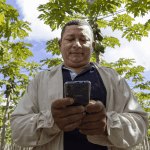Accelerating Systems Change: An Innovative Accelerator Shows How Funders Can Amplify Social Enterprises’ Impact by Transforming Their Funding Model
There’s a widespread consensus that the world is at a turning point, as we face a growing list of interrelated crises — from climate change and mass migration, to war and food insecurity. And there’s a growing belief that solving these global challenges will require us to change the systems that underlie them. This sort of change can only happen through a long-term process that requires empathy, trust and multi-stakeholder collaboration.
Ashoka is working with a global network of social entrepreneurs to advance the process of systems change around the world through social innovation. We define systems change as addressing the root causes of problems rather than their symptoms, by shifting and transforming structures, customs, mindsets, power dynamics and rules through collaboration across a diverse set of actors on a local, national and global level.
These actors can include many different types of stakeholders, from businesses to NGOs and government officials — and they all have valuable roles to play. But as an organization that specializes in social entrepreneurship, we recognize that funders can play a particularly important role in systems change.
The Challenges of Funding Systems Change
Social entrepreneurs are innovative forces of change. They are well-placed to accelerate the transformation of systems by developing impactful new solutions and making them widely available. Yet while many of these organizations seek for their solutions to be replicated at a national and even international level, impact scalability is a common challenge they face, due to limited and often short-term funding.
This is where funders can make a dual impact, by supporting the growth of innovative solutions that are addressing many of the world’s most intractable problems, and — equally importantly — by transforming their own increasingly outdated approach. There is a clear need for funders to support long-term, systemic efforts to address major social issues. But traditional philanthropy and funding patterns are often ill-suited to tackle these sorts of complex challenges, and may end up prolonging the issues they aim to solve.
For instance, by focusing on providing immediate relief rather than addressing the root causes of the problem, these funding models can keep communities from developing sustainable and systemic solutions. Rather than involving and empowering local communities in the problem-solving process, they tend to impose solutions as an outside stakeholder, which ends up discouraging local ownership of these solutions, perpetuating unhealthy power dynamics and reinforcing inequalities. And since typical philanthropic efforts tend to be fragmented rather than collaborative, donors and foundations often find themselves working in silos and overlooking the persistent underlying issues they’re failing to resolve. That’s why funders, and the rest of the innovation ecosystem, need to rethink the way systems change is funded.
The good news is that some funders are experimenting with and supporting more forward-looking, systems change-focused models. One example is the global Dela accelerator — a word that means “share” in Swedish — co-created by Ashoka and IKEA Social Entrepreneurship. The Dela accelerator shows how the corporate and social entrepreneurship sectors can combine their efforts, learn from each other and, in the process, create lasting positive change.
Reimagining Accelerators from a Systems Change Perspective
The Dela programme is based on the 10-year-old Ashoka Globalizer systems change accelerator, which contributes its unique competencies to the programme as part of a joint vision with IKEA Social Entrepreneurship. The Dela programme fosters collaboration between social entrepreneurs and other leaders from the business and social sector, with the goal of scaling the impact of their solutions (rather than simply scaling the social enterprise itself).
For instance, Fernando Assad, a leading social entrepreneur and the founder of Vivenda, joined Dela to expand the impact of his nonprofit, which addresses housing hazards that pose important health risks in Brazil. The programme has helped him to extend Vivenda’s reach through collaborations with other multilateral enterprises, such as the building company Gerdau, which is assisting the nonprofit in developing and scaling its system of home renovation. During its participation in the programme, Vivenda started to provide affordable and easy-to-install home improvement kits to mitigate the unsafe housing situation in Brazil’s favelas. It has effectively reached 6,000 people indirectly through this model, as it has worked with Gerdau to disseminate these kits to new beneficiaries. When asked to reflect on his participation in the programme, Assad said: “The Dela accelerator helped us take a step back from our daily craziness and dedicate time to shape our systemic goals. Co-creating our systems change strategy with an incredible group of consultants and IKEA staff members was a game-changing event for the whole organization.”
Beyond its direct support to social entrepreneurs, Dela has also contributed to unlocking funding for participating enterprises: Liisa Smits, social entrepreneur and founder of Ignitia, the first accurate and reliable weather forecast system in the tropics, received IKEA Social Entrepreneurship’s first-ever equity investment after her participation in the Dela accelerator. This funding — along with the high-level mentorship and networking opportunities it brought — has enabled her team to expand their impact to more small farmers based on the systems change strategy they developed during the accelerator. “By engaging as partners with shared values, IKEA showcased early on how they could contribute and what their values were beyond what’s stated on a corporate wall,” Smits said.
Shifting the Funding Sector’s Focus to Systems Change
The funding sector has a true opportunity to deepen its impact and address the most urgent social and environmental issues — the kinds of challenges that threaten people’s livelihoods and the world itself. IKEA Social Entrepreneurship’s equity investment in Ignitia shows that it actually is possible to evolve towards a funding sector that supports long-term, systemic change.
Navigating this transition certainly won’t be simple or easy. It will require extensive collaboration between funders, organizations and entrepreneurs, a concerted effort to build relationships based on mutual trust, an understanding that the outcomes of these collaborations won’t always be immediate — and ultimately, a shift towards investment models that reflect this new focus. But if this transition is successful, it could have a transformative impact on the development and scaling of system-changing innovations that solve deep-rooted social problems in every corner of the world.
Ashoka’s approach to systemic funding is summarized in the 2020 report “Embracing Complexity. Towards a Shared Understanding of Funding Systems Change.” Developed between Ashoka and McKinsey & Company, with the collaboration of Catalyst 2030, Co-Impact, Echoing Green, Schwab Foundation for Social Entrepreneurship, Skoll Foundation and Systemiq, it highlights the need for a transformation of the “system” of funding systemic change itself, and explores some fundamental changes that funders must make to advance that transformation. These changes include the need to transition:
- From funding programs to funding people, by providing resources such as mentorship, training and networking opportunities to help them achieve their goals.
- From short-term projects to long-term purpose, by investing in long-term initiatives that have a broader social purpose and are better equipped to tackle complex challenges.
- From symptoms to systemic strategies, by addressing the root causes of global problems and creating sustainable solutions.
- From quantitative metrics to quality relationships, by placing greater emphasis on building valuable relationships with stakeholders, including beneficiaries, partners and communities.
- From fixed outcomes to curiosity and learning, by recognizing that complex social challenges require ongoing experimentation and adaptation.
- From individual initiatives to collaborative ecosystems, by bringing together diverse stakeholders and creating opportunities for innovation and collective impact.
It is becoming increasingly evident that the corporate and social sector can (and should) co-create, add value to each other, and benefit people and the planet. Unleashing new funding and collaboration models is key to this, and we hope Dela illustrates a successful example. If you wish to learn more about the programme, click here.
Stella Printezi is the Lead Partnership and employee engagement manager at the Ashoka Globalizer team; Celia Sanchez-Valladares Barahona co-leads Ashoka’s communications in Europe; and Lucía Tornero leads the communications strategy for the Ashoka South Cone office.
Photo courtesy of Laura Ockel, via Unsplash.
- Categories
- Investing, Social Enterprise



